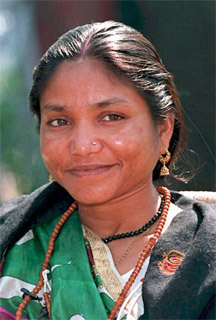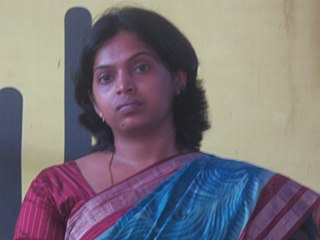Related Research Articles

Phoolan Devi, popularly known as the Bandit Queen, was an Indian dacoit (bandit) and politician, who became a member of parliament before being assassinated. She was a woman of the Mallah subcaste who grew up in poverty in a village in the state of Uttar Pradesh, where her family was on the losing side of a land dispute which caused them many problems. After being married off at the age of eleven and being sexually abused by various people, she joined a gang of dacoits. Her gang robbed higher caste villages and held up trains and vehicles. She became a heroine to the lower castes for being a Robin Hood figure who punished her rapists and evaded capture by the authorities. Phoolan Devi was charged in absentia for the 1981 Behmai massacre, in which twenty Thakur men were executed, allegedly on her command. After this massacre the Chief Minister of Uttar Pradesh resigned and calls to apprehend her were amplified. She surrendered two years later in a carefully negotiated settlement and spent eleven years in Gwalior prison, awaiting trial.
Gram panchayat is a basic governing institution in Indian villages. It is a political institution, acting as the cabinet of a village. The gram sabha works as the general body of the gram panchayat. The members of the gram panchayat are elected directly by the people. The president of a gram panchayat is known as a "Pradhan" or "Sarpanch". There are about 250,000 gram panchayats present in India.
Kinkri Devi was an Indian activist and environmentalist, best known for waging a war on illegal mining and quarrying in her native state of Himachal Pradesh. She never knew how to read or write and learned how to sign her name a few years before her death.

Kamla Beniwal is an Indian politician. She was a senior member of Indian National Congress party. She served as a minister on different posts and Deputy Chief Minister of Rajasthan in 2003. Later she served as Governor of different Indian states between 2009 and 2014. She became the first woman minister in Rajasthan in 1954 at the age of 27. She has been the first ever woman Governor of any northeastern state. She was awarded Tamrapatra by former prime minister Indira Gandhi in recognition of her contribution in the freedom struggle.

Chhavi Rajawat was the Sarpanch of her village Soda, 60 kilometres (37 mi) from Jaipur. Though holding an elected post, Chhavi is not affiliated to any political party. The Panchayats are officially supposed to be non-partisan and Panchayat elected representatives thereby, do not fit into the bracket of mainstream politics. She has been reported to be the youngest person to hold the office of sarpanch.
Bhanwari Devi is an Indian social-worker from Bhateri, Rajasthan, who was gang raped in 1992 by men angered by her efforts to prevent a child marriage in their family. Her subsequent treatment by the police, and court acquittal of the accused, attracted widespread national and international media attention, and became a landmark episode in India's women's rights movement.
Bidasar or Beedasar is a village in the Laxmangarh administrative region of Sikar district of Indian state Rajasthan. It lies 15 kilometres (9.3 mi) east of Laxmangarh and 7 kilometres (4.3 mi) west of Nawalgarh. It borders Khinwasar, Birodi Bari, Bidsar, Birodi Chhoti, Jogiyon ka bas, and Brahmino ki Dhani villages.
Meethari Marwar is a village in Ladnun tehsil of Nagaur district in the Indian state of Rajasthan.

Vishaka and Ors. v State of Rajasthan was a 1997 Indian Supreme Court case where various women's groups led by Naina Kapur and her organisation, Sakshi filed Public Interest Litigation (PIL) against the state of Rajasthan and the central Government of India to enforce the fundamental rights of working women under Articles 14, 19 and 21 of the Constitution of India. The petition was filed after Bhanwari Devi, a social worker in Rajasthan, was brutally gang raped for stopping a child marriage.

The Nari Shakti Puraskar is an annual award given by the Ministry of Women and Child Development of the Government of India to individual women or to institutions that work towards the cause of women empowerment. It is the highest civilian honour for women in India, and is presented by the president of India on International Women's Day at Rashtrapati Bhavan in New Delhi. The award was instituted in 1999 under the title of Stree Shakti Puraskar, renamed and reorganised in 2015. It is awarded in six institutional and two individual categories, which carry a cash prize of 200,000 and 100,000 rupees, respectively.
Bhanwar Lal Sharma was an Indian politician. He was a 7th term Member of Legislative Assembly (MLA) from Sardarshahar, Churu, Rajasthan. He emerged as a national figure in the Brahmin Samaj as he was President of All India Brahmin Federation since 2011. He was a Cabinet Minister of Indira Gandhi Neher Pariyojana in Rajasthan Government.
Yashoda Devi (1927–2004) was the first woman to be elected from a former princely state of India as a member of a legislative assembly. She was elected to the Legislative Assembly of Rajasthan from the Banswara constituency in 1953 as a candidate of the Socialist Party. Her success, in which she obtained 63.75 per cent of the vote, resulted from a by-election which took place due to the poll for the prior MLA being deemed illegal. In total, four women candidates contested the constituency.
All India Dalit Mahila Adhikar Manch (AIDMAM) is a platform for women from the Dalit community to raise their voices for justice. This platform has raised several struggles and movements for self-respect and dignity. AIDMAM is a movement which was initiated by the National Campaign on Dalit Human Rights (NCDHR). The aim of the movement is to recognize how the class, caste, and gender identity of a dalit woman overlap and place them at the very bottom of the social hierarchy. They work to empower dalit women to challenge these caste, class, and gender hierarchies and move forward in their struggle for justice. They do so through networking, enhancing skills and leadership at the state and district level.

Uda Devi Pasi was an Indian woman freedom fighter who participated in the war on behalf of Indian soldiers against the British East India Company, during the Indian Rebellion of 1857. She was a member of the women's squad of Wajid Ali Shah, the sixth Nawab of Awadh.
Vediya orVeriya is a village located in chitalwana tehsil of Sanchore district. Vediya is 50km from Tehsil headquarter and 62km from District headquarter. Here the village panchayat is Bheemgura. Vediya village is the important village of Chitalwana tehsil. From here, the Border Roads Organization passes through the National Highway 15.

Arati Devi is India's youngest elected sarpanch from Dhunkapada Gram Panchayat in Ganjam district, Odisha.

Bina Devi is an Indian leader who became known for inspiring women to become businesswoman through mushroom cultivation. Nicknamed 'Mushroom Mahila' for popularising mushroom cultivation, Bina Devi gained respect and became the Sarpanch of Dhauri Panchayat, Tetiabamber block for five years. She has trained farmers on mushroom and organic farming, vermicompost production and organic insecticide preparation.
Sudha Patel is India’s youngest elected blind female sarpanch. She was elected in June 1995 as the sarpanch of Changa village in Anand district, Gujarat. Patel is the recipient of the prestigious Ten Outstanding Young Persons of World (1997) award, Outstanding Woman Panchayat Leader of India award, and was awarded the Jagdish K Patel Award by the President of India.
Kavita Devi, alternatively Kavita Bundelkhandi, is an Indian journalist and news presenter. She is the editor-in-chief and co-founder of the grassroots feminist news network Khabar Lahariya. Devi was notably the first Dalit ("untouchable") to become a member of the Editor's Guild of India.

Payal Jangid is an Indian children's rights activist. She campaigns against child marriage, child labor and for the right to education for girls.
References
- 1 2 3 4 "From a Stone-Cutter to a Computer-Educated Sarpanch – The Fascinating Story of Nauroti Devi". The Better India. 21 June 2016. Retrieved 25 June 2017.
- 1 2 Subrahmanyam, G.S. "The extraordinary life of a Dalit woman sarpanch". The Hindu. Retrieved 25 June 2017.
- ↑ VagaBomb (22 June 2016). "Stone Cutter to Village Sarpanch: The Extraordinary Story of Nauroti Devi". VagaBomb. Retrieved 25 June 2017.
- ↑ "These 5 Women Panchayat Leaders Have Made Extraordinary Contributions To Their Villages". Women's Web: For Women Who Do. 5 December 2016. Retrieved 25 June 2017.